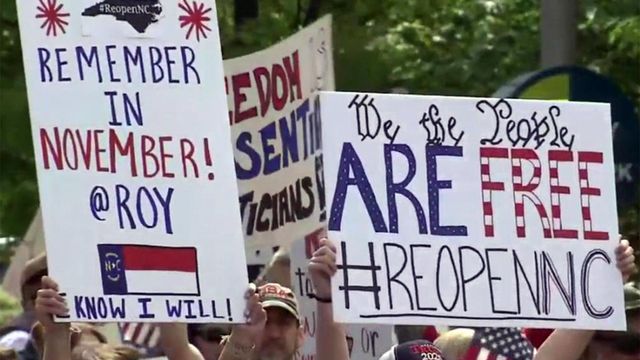Poll: Reopening during pandemic, vaccine, masks remain political issues
North Carolina residents are sharply divided on the pace of reopening businesses and resuming social activities during the coronavirus pandemic, with politics serving as a major fault line in the debate, according to a WRAL News poll released Wednesday.
Posted — UpdatedSurveyUSA polled 750 people statewide between last Thursday and Sunday for the exclusive poll and found that getting a coronavirus vaccine and wearing masks in public are also political issues. The responses have a credibility intervals ranging between +/-3 percentage points to +/-4.9 percentage points.
Respondents are fairly evenly split on how North Carolina is reopening amid the pandemic, with 31 percent saying it's happening too quickly, 29 percent too slowly and 34 percent at the proper speed. But Republicans polled were more than five times as likely as Democrats (48-9 percent) to say reopening isn't happening fast enough. Forty-one percent of Democrats said the state needs to slow down reopening efforts, compared with 24 percent of Republicans, while 42 percent of Democrats and only 23 percent of Republicans said reopening has been handled properly so far.
Political moderates and unaffiliated voters were between the two extremes, with 41 percent of moderates and 37 percent of unaffiliated respondents saying the state is doing a good job on reopening. Twenty-seven percent of moderates and 29 percent unaffiliated say it's happening too quickly, while 24 percent of moderates and 30 percent of unaffiliated voters say it's too slow.
Black and Latino respondents – two groups disproportionately affected by the virus – also were more likely to say the state needs to slow the pace of reopening, at 46 and 44 percent, respectively. Only 7 percent of Black people polled and 21 percent of Latino people said the process was moving too slowly. Meanwhile, 36 percent of white respondents said reopening needs to move faster, with 25 percent saying it's already too fast.
Younger people, parents – especially single parents – people in cities and both poor and wealthy people all were more likely to say the state is moving too fast on reopening, according to the poll. Middle-class respondents and those age 50 and older were more likely to say it's going too slow. Men were at either extreme (35 percent too quickly and 33 percent too slowly), while 39 percent of women said the current pace is right.
When it comes to when life will return to normal after the pandemic, about three in five said it would take six months to a year. But nearly twice as many (17-9 percent) said pre-pandemic life would never return, compared with those who expect normalcy again in three months.
Forty-five percent of Republicans were in the three- to six-month camps, compared with only 22 percent of Democrats. Nearly half of Democrats polled (47 percent) said 12 months. There was a similar economic breakdown, with those who classify themselves as wealthy three times as likely (46-15 percent) as those who call themselves poor to predict normalcy within six months. Nearly three-quarters of the poor respondents said it would be at least 12 months, including 30 percent who said it would never happen.
Masks more acceptable
While 90 percent of respondents said they wear masks in public to limit the spread of coronavirus – up from 65 percent in a WRAL News poll conducted in April – 13 percent of Republicans said they still don't, compared with only 1 percent of Democrats.
When it comes to whether masks should be required in public, the ideological differences are even more stark. Republicans were eight times as likely as Democrats (32-4 percent) to say they shouldn't be required. Overall, 74 percent of those polled said they should be required, with Black and Latino respondents, people age 65 or older, urban residents and those who classify themselves as wealthy all registering 85 percent or higher support for requiring masks.
Among those who actually do wear masks, women, people older than 35, Blacks, Latinos, college graduates, urban and suburban residents and the wealthy also topped the 90 percent mark.
Vaccine a flashpoint
Getting vaccinated against the coronavirus has become the latest political flashpoint, with President Donald Trump accusing Democratic challenger Joe Biden of spreading "conspiracy theories" to undermine trust in any vaccine that is approved before the November election. Republican U.S. Sen. Thom Tillis' campaign has flogged his challenger, Cal Cunningham, this week after the Democrat said he would be hesitant to get vaccinated.
Cunningham isn't the only one to be leery of a vaccine, however, according to the poll. Only 23 percent said they would get vaccinated as soon as a drug is approved, with 28 percent saying they would wait a few months, 14 percent saying they would wait at least a year and 22 percent saying they would never get vaccinated.
Twenty-eight percent of Republicans said they would get vaccinated right away, compared with 24 percent of Democrats. Nearly a third of Democrats said they would wait a few months. Meanwhile, another 27 percent of Republicans said they would never get vaccinated, compared with 17 percent of Democrats.
Men are much more likely than to get vaccinated as soon as possible (33-13 percent), with 30 percent of women saying they want to wait a few months. Latino respondents (39 percent), wealthy people (47 percent), urban residents (35 percent) and LGBT household members (44 percent) also were often ready to roll up their sleeves for a shot.
Meanwhile, only 9 percent of Black respondents and 17 percent of rural residents say they would get vaccinated immediately.
Related Topics
• Credits
Copyright 2024 by Capitol Broadcasting Company. All rights reserved. This material may not be published, broadcast, rewritten or redistributed.






